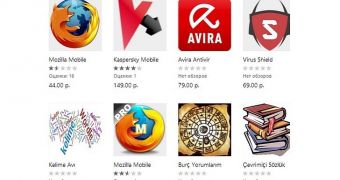Kaspersky Lab researchers have stumbled upon fake Kaspersky mobile security solutions on both the Windows Phone Store and Google Play.
The mobile apps uploaded by cybercriminals to popular app markets don’t necessarily have to be malicious in order to help them make some money. They can also upload applications that do nothing and ask users to pay for them.
Kaspersky experts have come across an application on the Windows Phone Store called Kaspersky Mobile. The app costs around $4.3 (€3.1), but it has nothing to do with the security company.
Similar to Virus Shield, the bogus app that made numerous headlines after hundreds of users purchased it from Google Play, this “Kaspersky Mobile” app most likely doesn’t do anything, despite the fact that the screenshots appear to demonstrate some interesting features.
The same cybercriminals have uploaded several bogus app disguised as legitimate programs to the Windows Phone Store, including Mozilla Mobile, Avira Antivir, Netscape Mobile, Google Chrome Pro, Opera Mobile, Internet Explorer, and even Virus Shield.
All of these apps cost a certain amount of money, but most likely none of them actually works.
On Google Play, experts have found an application called Kaspersky Anti-Virus 2014. The app has nothing to do with the security company. In fact, Kaspersky’s mobile security solution is called Kaspersky Internet Security for Android.
“The fake app does absolutely nothing to protect the user’s device – the creators didn’t even bother to add a simulation of a scanner,” Kaspersky Lab Expert Roman Unuchek notes in a blog post.
“Instead of a security solution the buyer gets nothing more than a fake app whose functionality is limited to random statements along the lines of a Magic 8-Ball set against a background of the Kaspersky Anti-Virus logo.”
While most of the bogus apps were cheap, researchers have also found one that cost around $100 (€73). The application was called “I am rich,” but it didn’t help users become rich in any way.
Experts believe that, similar to other such apps spotted in the past, it most likely only displays an image of an expensive jewel.
Just because an app is hosted on a legitimate marketplace doesn’t necessarily mean it’s genuine. That’s why users are advised to be cautious before purchasing or downloading applications.
Checking reviews is sometimes not enough to make sure an app is good. Users must also verify the developer and see what other application’s they’re offering.
Update. E Hacking News has also identified some fake apps on the Windows Phone Store. They've been uploaded by someone called Cheedella Suresh, which appears to be an Indian name.

 14 DAY TRIAL //
14 DAY TRIAL //